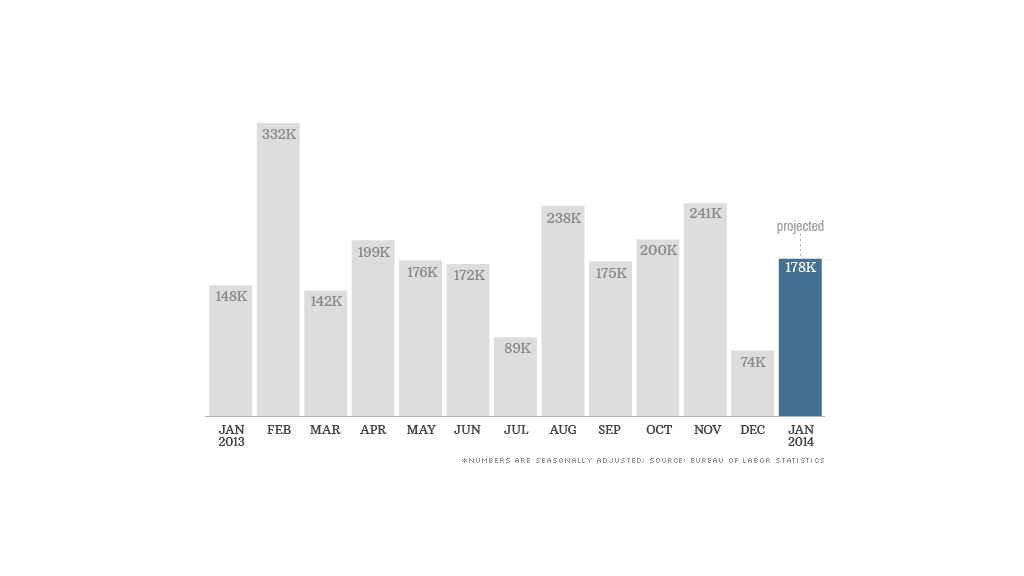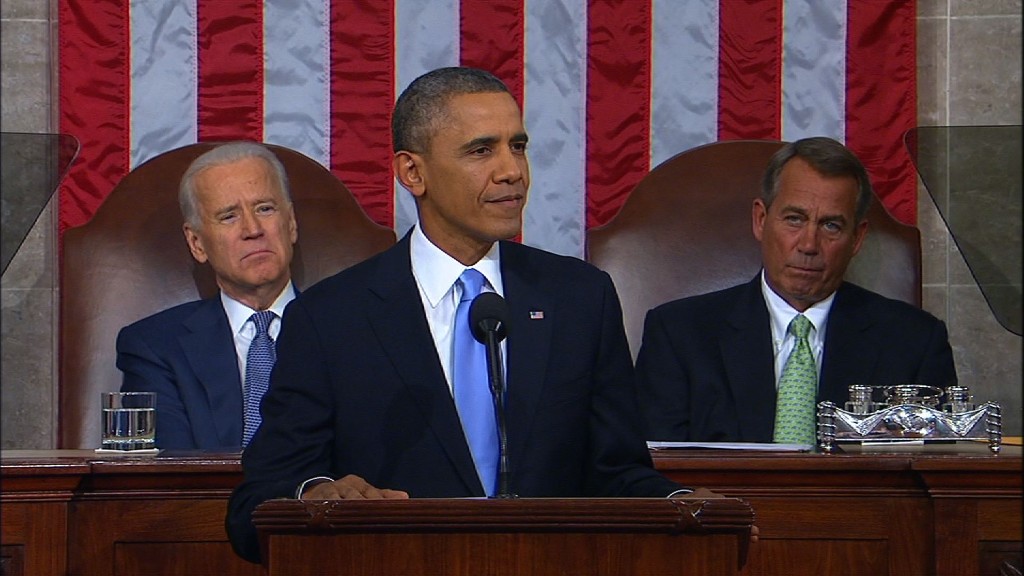
The outlook for the job market couldn't be murkier.
Snowstorms, big annual revisions and the end of benefits for the long-term unemployed could give a distorted picture of the job market when January's labor report comes out Friday.
Economists surveyed by CNNMoney are predicting 178,000 jobs were created last month. That would be a big improvement from December's shockingly low 74,000 jobs.
Meanwhile, they predict the unemployment rate will remain at 6.7%.
But wild cards like bad weather, yearly revisions and the end of federal jobless benefits, have economists on edge about their predictions.
"This is a particularly weird month, coming as it does after December's strange and less-than-fully-believable results," said Bill Hampel, chief economist of the Credit Union National Association.
Why all the uncertainty?
1) December was an 'aberration': Economists are still puzzled by last month's jobs report. Other data had shown the economy was strengthening, and then boom: The report suddenly showed December was the weakest month for job growth in nearly three years.
The surprise led to all kinds of theories.
"I think the weak December numbers were an aberration, possibly caused by bad weather," said Bill Cheney, chief economist at Manulife Asset Management.
Digging deeper into the details also showed a few anomalies that economists think will be revised in the future. Accounting firms suddenly cut 25,000 jobs, for example.
"That's pretty bizarre," said Mark Zandi, chief economist for Moody's Analytics. "There's no reason to think that actually happened in the month."
2) Did the cold curb hiring? If weather is to blame, January might not be much better. Both the Polar Vortex and Atlanta's snow standstill struck last month. Frigid weather has been hitting virtually all major sectors of the economy, with manufacturers, real estate agents and auto dealers blaming weak sales on the cold temperatures.
"As in December, the extreme winter weather will likely dampen job growth in January," said Sal Guatieri, chief economist at BMO Capital Markets.
3) Revisions could be huge: When the Labor Department releases a monthly jobs report, it typically revises the prior two months as well. Economists are expecting an upward revision to December's figures.
"I think a big part of the story this month will have less to do with the initial January estimates to be released on Friday, and more to do with revisions to December's," Hampel said.

In addition, there are broader revisions coming this month. The jobs report comes from two surveys: one of 60,000 households, and the other of 145,000 businesses. This month, it will revise data from both surveys.
The first major revision accounts for the growing population and could alter the unemployment rate slightly.
The second comes from a more complete count of payrolls, and is expected to show 345,000 more jobs were added in 2013 than were originally counted.
"This report will be tough to digest and compare given the revisions," said Sam Bullard, senior economist for Wells Fargo.
4) Are the unemployed giving up? When Congress failed to extend emergency unemployment benefits for the long-term unemployed, 1.3 million Americans suddenly stopped receiving checks at the end of December. What happened to these people?
If they continued looking for work -- as was required while receiving benefits -- they'll still be counted among America's nearly 10 million unemployed. But if they suddenly gave up their job searches, they wouldn't be counted and the unemployment rate could fall, said Guatieri.
As of December, only 62.8% of American adults participated in the labor force -- meaning they either had a job or were looking for one. That matches the lowest rate since 1978, but it could break a new 35-year low if the long-term unemployed are giving up hope.
5) Other January data are discouraging: Not many numbers have been released yet showing how the economy fared in January, but here's what we know so far: Consumer confidence slumped, factory orders fell, auto sales dropped and manufacturers reported their weakest business in eight months.
Even if January job growth picked up, the broader story is certainly not rosy.
"I think there will be a bounce back from December's anemic jobs number, but going from anemic to sub-par growth in the labor market is nothing to celebrate," said Sean Snaith, director of the Institute for Economic Competitiveness at the University of Central Florida.
6) What will the Fed do? The Fed has sounded more optimistic about the future lately. But what will it do if the January jobs report disappoints?
Newly appointed Federal Reserve Chair Janet Yellen is scheduled to testify before Congress next week, and is expected to say the recent string of bad news is a soft patch related to temporary factors, like weather.
Overall, economists still expect 2014 to be a stronger year for the job market and economic growth than 2013.
"The economy is either at a turning point or approaching a turning point. Either way, this is a horrible time to be a forecaster," said Bill Watkins, executive director of the Center for Economic Research and Forecasting at California Lutheran University.


